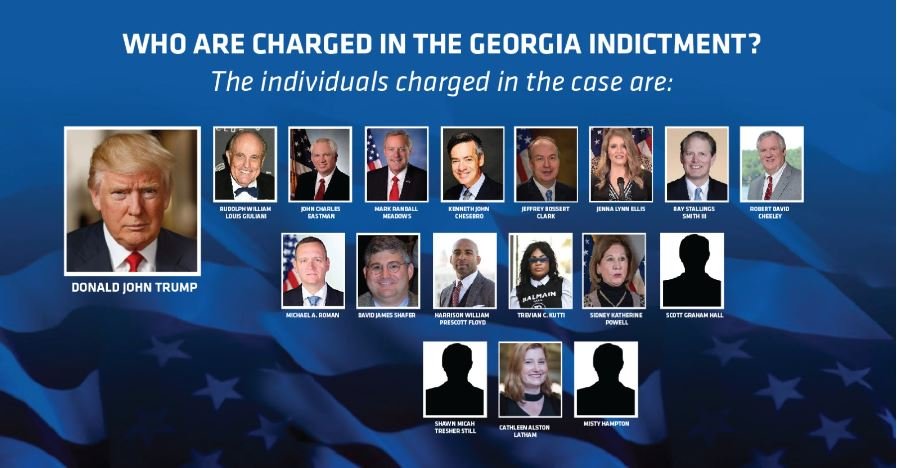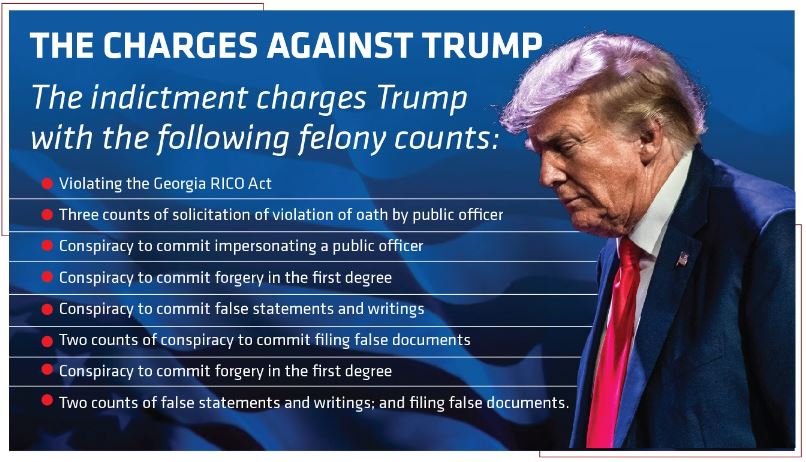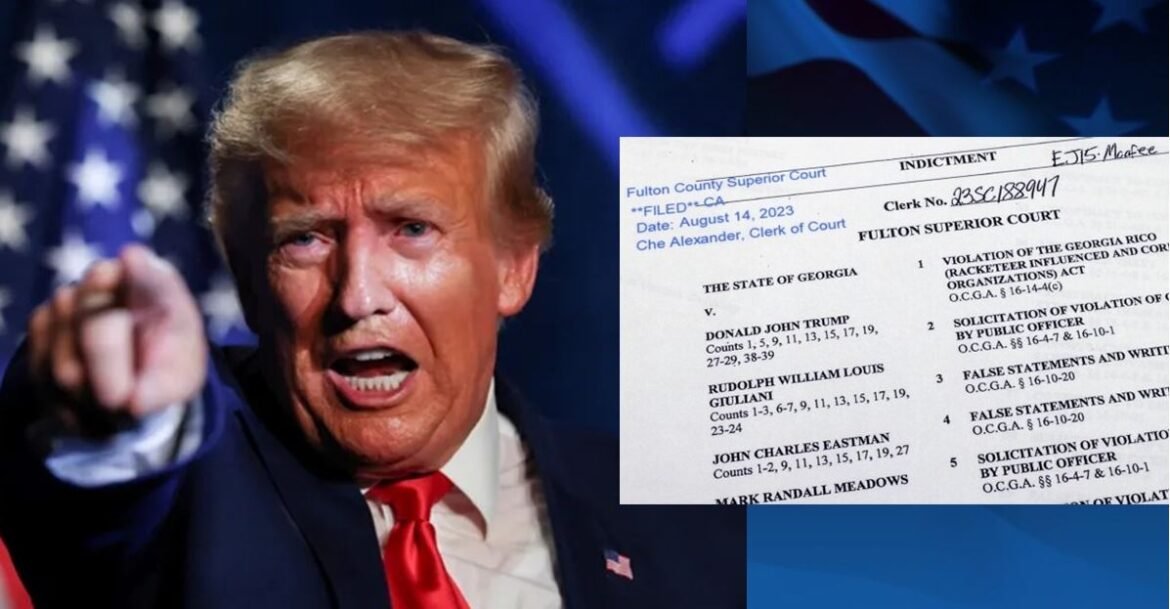Donald Trump has been charged on allegations of racketeering and a number of election crimes following an investigation lasting two years into his attempts to reverse his 2020 defeat to Joe Biden in the US’s Georgia
A grand jury in Fulton County, Georgia, has indicted former President Donald Trump and over a dozen of his associates on charges of election fraud, racketeering, and other offences related to alleged efforts to overturn the 2020 election. This is the most complex accusation levelled against the former president. The 77-year-old Republican presidential candidate faces three additional trials in New York, Washington DC, and Florida.
You can also read: Trump indicted for bid to overturn 2020 election
Along with 18 allies, Trump, the main Republican candidate for president in 2024, was indicted. He denies all thirteen allegations, which include racketeering and election interference. He has stated, however, that they are politically motivated.
Monday evening, Fulton County District Attorney Fani Willis announced at a press conference that all defendants in the case have been issued arrest warrants and have until August 25 at noon to surrender.
A web of conspiracy allegations
In February 2021, Georgia prosecutor Fani Willis initiated an investigation into allegations of election interference by Trump and his associates. On Monday night, prosecutors released a 98-page indictment detailing 41 offences against 19 defendants. All of the defendants were charged with racketeering, which targets members of organized crime groups and entails a maximum prison sentence of 20 years.
“Trump and the other defendants charged in this indictment refused to accept that Trump lost, and they knowingly and willfully joined a conspiracy to unlawfully change the outcome of the election in favor of Trump,” the indictment said. The indictment refers to the defendants as a “criminal organization”, accusing them of other crimes including influencing witnesses, computer trespass, theft and perjury.

Giuliani, a former federal prosecutor and New York City mayor from 1994 to 2001, served as Trump’s personal counsel for more than half of his presidency. Giuliani led the effort, as he identified it, to find voter fraud and, according to prosecutors, overturn the election. In a July interview with CBS News, Giuliani’s attorney Robert Costello defined his role in the aftermath of the election, “Among this group of election fraud lawyers and investigators, he was like the general of this army.”
What are the charges against Trump?
Georgia, which Biden won by less than 12,000 ballots, represents perhaps the greatest threat to Trump’s freedom as he comfortably leads the field for his party’s nomination to seek re-election. Trump called Georgia officials weeks before he was scheduled to depart the White House, putting pressure on them to “find” the 11,780 votes necessary to reverse Biden’s victory in the Peach State. The indictment describes an alleged conspiracy to tamper with voting machines and steal data in one Georgia county.

Violation of the Racketeer Influenced and Corrupt Organizations Act (RICO) Act carries a maximum prison sentence of twenty years. The act, which is intended to help disassemble organized criminal syndicates such as the mafia, enables prosecutors to connect the dots between subordinates who violated the law and their superiors.
Trump’s inseparable entanglements with legal troubles
Since leaving office, Trump has been plagued by legal issues and he is the first ever president in US to face criminal charges. Earlier this month, federal prosecutors in Washington DC charged Trump with conspiring to overturn the 2020 election, which he lost to Democrat Joe Biden. This charge document devoted considerable space to the activities of the Trump team in Georgia. Trump has entered a not-guilty plea in this case. Willis’s investigation focuses explicitly on Georgia, a crucial swing state where Trump narrowly lost the 2016 presidential election.
Trump is also scheduled to stand trial in New York state on March 25, 2019, for allegedly paying hush money to a pornographic actress. And on 20 May, he is scheduled to stand trial in Florida on charges related to his management of classified documents discovered at his Mar-a-Lago residence after leaving office.
In addition to the criminal cases, a jury in New York held him liable for sexually abusing and defaming the author E. Jean Carroll and awarded her $5 million in May. The trial for a second defamation lawsuit seeking $10 million in damages is scheduled for January 15. Trump denies misconduct. Trump is scheduled to stand trial in New York in October in a civil case in which he and his family business are accused of committing fraud to obtain better terms from lenders and insurers.
After being found guilty of tax evasion in December by a New York court, Trump’s company was fined $1.6 million.
Implications for Trump and beyond
Trump’s response and legal strategy will be closely monitored as legal proceedings progress. In contrast to federal courthouses, which generally prohibit electronic recording, Georgia’s courts are more transparent, allowing the public to observe proceedings on television displays across the country beginning with preliminary hearings. With the 2024 presidential election in mind, the outcome of these legal battles could have a significant impact on his political future.
While his primary supporters remain loyal, the perception of his legal battles by the broader electorate could alter the election’s dynamics. While a significant portion of Republicans in Congress staunchly defend Trump, claiming that Democrats are conducting a politically-motivated “witch hunt” through the Justice Department, the ultimate verdict hinges on a jury’s determination of whether criminal intent can be proven against the wealthy real estate magnate, who maintains his innocence.
“Trump’s legal troubles pose a unique challenge for him as he navigates a complex legal landscape,” explains political scientist Mark Reynolds. “His ability to rally voters and expand his base may hinge on how effectively he addresses these charges.”
Additionally, the indictment raises broader questions regarding the limits of presidential authority and accountability. Trump’s legal challenges as a former president are occurring in an era where traditional norms and legal boundaries are being redefined. The outcome of these cases could serve as an example for how future administrations will be held accountable for their actions following their terms in office.
In the coming months, the country will witness a high-stakes legal battle with notable political and legal implications. Trump’s legal team and prosecutors will engage in a legal battle that has the potential to transform public perceptions, influence electoral dynamics, and define the limits of executive power in the post-presidential era.


